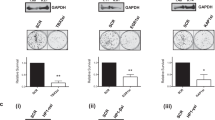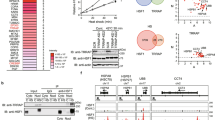Abstract
Heat shock factor 1 (HSF1), the transcriptional activator of the heat shock genes, is increasingly implicated in cancer. We have shown that HSF1 binds to the corepressor metastasis-associated protein 1 (MTA1) in vitro and in human breast carcinoma samples. HSF1–MTA1 complex formation was strongly induced by the transforming ligand heregulin and complexes incorporated a number of additional proteins including histone deacetylases (HDAC1 and 2) and Mi2α, all components of the NuRD corepressor complex. These complexes were induced to assemble on the chromatin of MCF7 breast carcinoma cells and associated with the promoters of estrogen-responsive genes. Such HSF1 complexes participate in repression of estrogen-dependent transcription in breast carcinoma cells treated with heregulin and this effect was inhibited by MTA1 knockdown. Repression of estrogen-dependent transcription may contribute to the role of HSF1 in cancer.
This is a preview of subscription content, access via your institution
Access options
Subscribe to this journal
Receive 50 print issues and online access
$259.00 per year
only $5.18 per issue
Buy this article
- Purchase on Springer Link
- Instant access to full article PDF
Prices may be subject to local taxes which are calculated during checkout





Similar content being viewed by others
Accession codes
References
Bewick M, Chadderton T, Conlon M, Lafrenie R, Morris D, Stewart D et al. (1999). Expression of C-erbB-2/HER-2 in patients with metastatic breast cancer undergoing high-dose chemotherapy and autologous blood stem cell support. Bone Marrow Transplant 24: 377–384.
Bowen NJ, Fujita N, Kajita M, Wade PA . (2004). Mi-2/NuRD: multiple complexes for many purposes. Biochim Biophys Acta 1677: 52–57.
Cahill CM, Waterman WR, Auron PE, Calderwood SK . (1996). Transcriptional repression of the prointerleukin1B gene by heat shock factor 1. J Biol Chem 271: 24874–24879.
Calderwood SK, Khaleque MA, Sawyer DB, Ciocca DR . (2006). Heat shock proteins in cancer: chaperones of tumorigenesis. Trends Biochem Sci 31: 164–172.
Chen C, Xie Y, Stevenson MA, Auron PE, Calderwood SK . (1997). Heat shock factor 1 represses ras-induced transcriptional activation of the c-fos gene. J Biol Chem 272: 26803–26806.
Ciocca DR, Calderwood SK . (2005). Heat shock proteins in cancer: diagnostic, prognostic, predictive, and treatment implications. Cell Stress Chaperones 10: 86–103.
Gago G, Kurth D, Diacovich L, Tsai SC, Gramajo H . (2006). Biochemical and structural characterization of an essential acyl coenzyme a carboxylase from mycobacterium tuberculosis. J Bacteriol 188: 477–486.
Hoang AT, Huang J, Rudra-Ganguly N, Zheng J, Powell WC, Rabindran SK et al. (2000). A novel association between the human heat shock transcription factor 1 (HSF1) and prostate adenocarcinoma. Am J Pathol 156: 857–864.
Jones EL, Zhao MJ, Stevenson MA, Calderwood SK . (2004). The 70 kilodalton heat shock protein is an inhibitor of apoptosis in cancer. Int J Hyperthermia 20: 835–849.
Khaleque MA, Bharti A, Sawyer D, Benjamin IJ, Stevenson MA, Calderwood SK . (2005). Induction of heat shock proteins by heregulin beta1 leads to protection from apoptosis and anchorage-independent growth. Oncogene 24: 6564–6573.
Kumar R, Wang RA, Bagheri-Yarmand R . (2003). Emerging roles of MTA family members in human cancers. Semin Oncol 30: 30–37.
Mazumdar A, Wang RA, Mishra SK, Adam L, Bagheri-Yarmand R, Mandal M et al. (2001). Transcriptional repression of oestrogen receptor by metastasis-associated protein 1 corepressor. Nat Cell Biol 3: 30–37.
Mosser DD, Morimoto RI . (2004). Molecular chaperones and the stress of oncogenesis. Oncogene 23: 2907–2918.
Neubauer BL, McNulty AM, Chedid M, Chen K, Goode RL, Johnson MA et al. (2003). The selective estrogen receptor modulator trioxifene (LY133314) inhibits metastasis and extends survival in the PAIII rat prostatic carcinoma model. Cancer Res 63: 6056–6062.
Tang D, Khaleque AA, Jones ER, Theriault JR, Stevenson MA, Calderwood SK . (2005). Expression of heat shock proteins and HSP messenger ribonucleic acid in human prostate carcinoma in vitro and in tumors in vivo. Cell Stress Chaperones 10: 46–59.
Toh Y, Kuninaka S, Endo K, Oshiro T, Ikeda Y, Nakashima H et al. (2000). Molecular analysis of a candidate metastasis-associated gene, MTA1: possible interaction with histone deacetylase 1. J Exp Clin Cancer Res 19: 105–111.
Wang X, Grammatikakis N, Siganou A, Calderwood SK . (2003). Regulation of molecular chaperone gene transcription involves the serine phosphorylation, 14-3-3 epsilon binding, and cytoplasmic sequestration of heat shock factor 1. Mol Cell Biol 23: 6013–6026.
Wang X, Grammatikakis N, Siganou A, Stevenson MA, Calderwood SK . (2004a). Interactions between extracellular signal-regulated protein kinase 1, 14-3-3epsilon, and heat shock factor 1 during stress. J Biol Chem 279: 49460–49469.
Wang X, Khaleque MA, Zhao MJ, Zhong R, Gaestel M, Calderwood SK . (2006). Phosphorylation of HSF1 by MAPK-activated protein kinase 2 on serine 121, inhibits transcriptional activity and promotes HSP90 binding. J Biol Chem 281: 782–791.
Wang Y, Theriault JR, He H, Gong J, Calderwood SK . (2004b). Expression of a dominant negative heat shock factor-1 construct inhibits aneuploidy in prostate carcinoma cells. J Biol Chem 279: 32651–32659.
Xie Y, Chen C, Stevenson MA, Auron PE, Calderwood SK . (2002). Heat shock factor 1 represses transcription of the IL-1b gene through physical interaction with nuclear factor of interleukin 6. J Biol Chem 277: 11802–11810.
Xie Y, Zhong R, Chen C, Calderwood SK . (2003). Heat Shock factor 1 contains two functional domains that mediate transcriptional repression of the c-fos and c-fms genes. J Biol Chem 278: 4687–4698.
Xue Y, Wong J, Moreno GT, Young MK, Cote J, Wang W . (1998). NURD, a novel complex with both ATP-dependent chromatin-remodeling and histone deacetylase activities. Mol Cell 2: 851–861.
Yao YL, Yang WM . (2003). The metastasis-associated proteins 1 and 2 form distinct protein complexes with histone deacetylase activity. J Biol Chem 278: 42560–42568.
Acknowledgements
We thank Dr Yasushi Toh for the pBJ-Myc-MTA1 expression plasmid, Dr Michael M Wang for pERE-Luc and Dr Ivor J Benjamin for hsf1 wild-type and null MEFs. This study was supported by NIH grant CA077465.
Author information
Authors and Affiliations
Corresponding author
Rights and permissions
About this article
Cite this article
Khaleque, M., Bharti, A., Gong, J. et al. Heat shock factor 1 represses estrogen-dependent transcription through association with MTA1. Oncogene 27, 1886–1893 (2008). https://doi.org/10.1038/sj.onc.1210834
Received:
Revised:
Accepted:
Published:
Issue Date:
DOI: https://doi.org/10.1038/sj.onc.1210834
Keywords
This article is cited by
-
HSP90 inhibitors disrupt a transient HSP90-HSF1 interaction and identify a noncanonical model of HSP90-mediated HSF1 regulation
Scientific Reports (2018)
-
The HSF1–PARP13–PARP1 complex facilitates DNA repair and promotes mammary tumorigenesis
Nature Communications (2017)
-
HSF1 regulation of β-catenin in mammary cancer cells through control of HuR/elavL1 expression
Oncogene (2015)
-
Targeting the hsp70 gene delays mammary tumor initiation and inhibits tumor cell metastasis
Oncogene (2015)
-
Multifaceted roles of HSF1 in cancer
Tumor Biology (2015)



